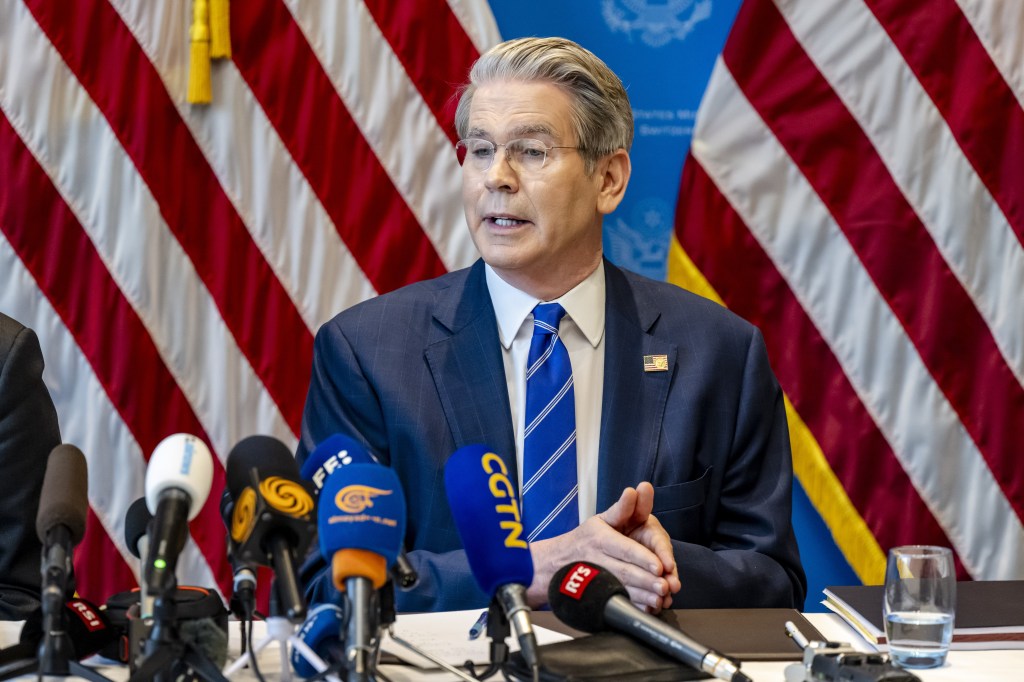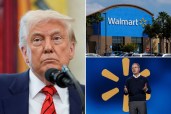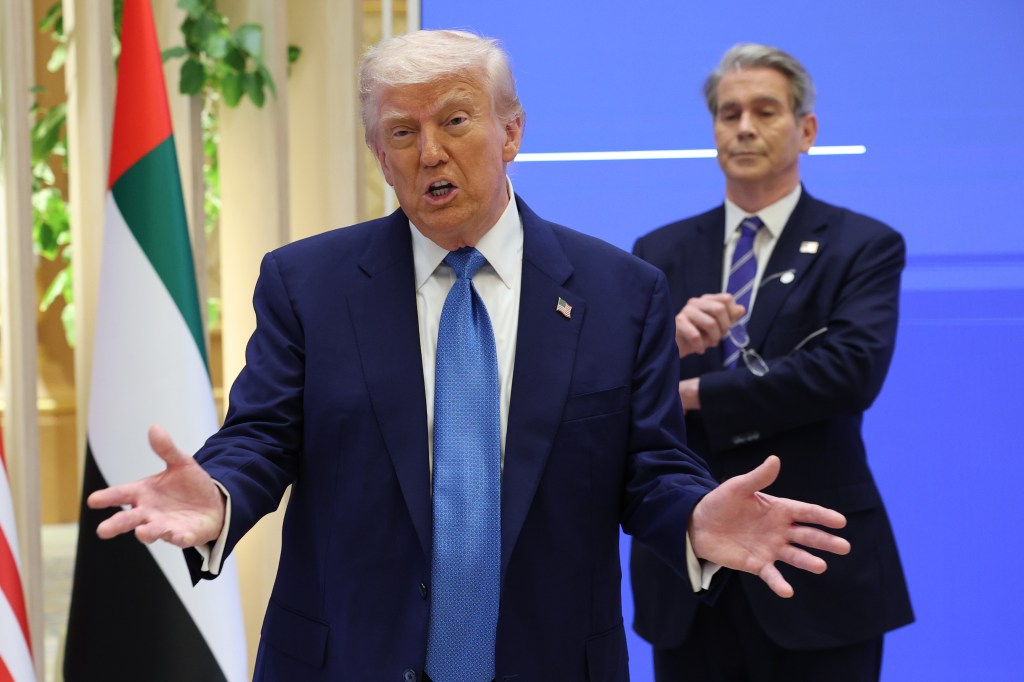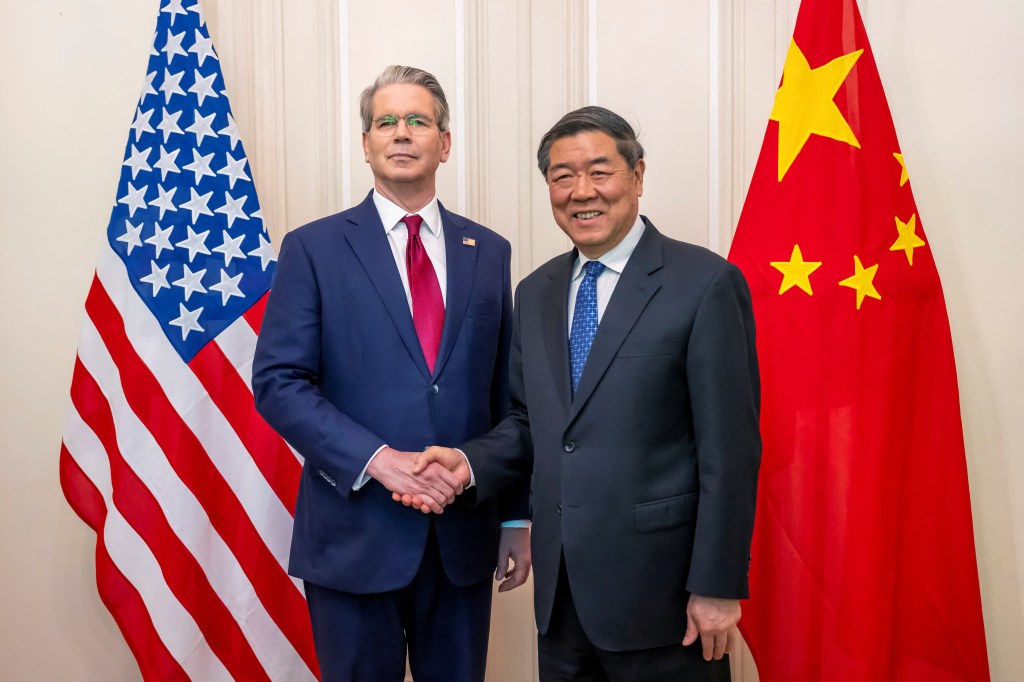Bessent Acknowledges: Trump's Tariffs Could Hit Walmart Shoppers' Wallets Harder
WASHINGTON — Treasury Secretary Scott Bessent admitted on Sunday that Walmart, America’s biggest retail store, might transfer some of the expenses caused by President Donald Trump’s tariffs to customers by increasing product prices.
Bessent characterized his conversation with the corporation's chief executive officer as occurring one day following Trump's warning to Walmart against increasing prices due to the tariffs and his pledge to closely monitor the company's actions.
Amid ongoing skepticism regarding Trump’s handling of the economy, Bessent countered worries about inflation, commended the ambiguity created by Trump as a strategic move in trade discussions, and disregarded Moody’s Ratings’ decision to lower the U.S. government’s credit grade on Friday.

However, Walmart does not seem ready to absorb all the tariffs entirely, despite President Trump’s insistence that both the company and China should bear this cost.
Bessent mentioned that he talked with Walmart CEO Doug McMillon on Saturday. He emphasized in two television interviews that the most important factor for Walmart shoppers was the drop in gas prices.
STAY INFORMED ABOUT RECENT DEVELOPMENTS BY JOINING OUR DAILY Morning Report NEWSLETTER
The average price of gas is currently around $3.18 per gallon, which is lower than last year but has increased over the past week, as reported by AAA.
"Walmart will absorb some of the tariffs, with others potentially getting passed on to shoppers," Bessent stated on CNN. "In general, I anticipate inflation to stay stable. However, I can understand why consumers might feel uneasy following the prolonged period of rising prices during Biden’s tenure," she added, referring to how inflation reached a 40-year peak in June 2022 when Joe Biden was president. This surge came due to factors such as post-pandemic economic adjustments, increased governmental expenditures, and the impact of Russia's invasion of Ukraine driving up expenses.
Walmart refrained from commenting on Bessent’s account of his discussion with McMillon.

On Saturday morning, Trump stated in a social media post that Walmart shouldn’t increase prices for customers to cover the expenses from new tariffs. "I'll be monitoring this closely, as well as your shoppers!!!" he wrote.
Bessent mentioned during Walmart’s earnings call on Thursday that due to federal regulations, they were required "to present the most extreme scenario possible to avoid litigation." In an interview with NBC, he also expressed that from his perspective, the resulting price hikes wouldn’t be very significant.
See Also “Consume the tariffs”: Trump admonishes Walmart following retailer’s warning of significant price increases
“Consume the tariffs”: Trump admonishes Walmart following retailer’s warning of significant price increases
But Walmart executives said last week that higher prices began to appear on their shelves in late April and accelerated this month.
"We are designed to maintain low prices, yet there is a threshold beyond which we simply cannot go, nor would any retailer," CFO John David Rainey stated to The Associated Press on Thursday.
Bessent argued that the ratings downgrade served as a " lagging indicator" since the financial markets had already factored in the expenses associated with a cumulative federal debt amounting to approximately $36 trillion.
Nevertheless, the tax proposal advocated by Trump would contribute approximately an additional $3.3 trillion to budget deficits over the coming ten years, with a significant portion of this, around $600 billion, slated for addition as early as 2027, as reported by the Committee for a Responsible Federal Budget.
The treasury secretary asserted that deficits wouldn’t pose an issue since the economy was expected to expand more rapidly than the buildup of debt, thereby decreasing its growth relative to the total economic output.
Many independent evaluations doubt the government's assertions that they can attain an average growth rate of 3%, considering that even President Trump's 2018 tax cuts did not manage to accomplish this.

The tax reductions implemented during Trump's first term indeed spurred economic growth prior to the pandemic; however, they simultaneously increased the budget deficit more than earlier projections made by the Congressional Budget Office.
Regarding tariffs, the Trump administration continues to work on setting rates with about 40 significant trade allies ahead of an upcoming July deadline.
It has just begun a 90-day negotiation period with China, following an agreement made last week. Reset the tariffs for that nation from 145% down to 30%. to ensure discussions can continue.

Bessent indicated that concerns among small business proprietors regarding tariffs were probably due to the higher rates formerly applied to goods from China. Nonetheless, this ambiguity has significantly hindered both consumers and enterprises as they attempt to formulate expenditure strategies for the upcoming weeks, months, and years.
Strategic uncertainty serves as a negotiation strategy," Bessent explained. "Therefore, if we provide excessive clarity to other nations, they might exploit this during talks.
Bessent was featured on NBC’s “Meet the Press” and CNN’s “State of the Union.”

Post a Comment for "Bessent Acknowledges: Trump's Tariffs Could Hit Walmart Shoppers' Wallets Harder"